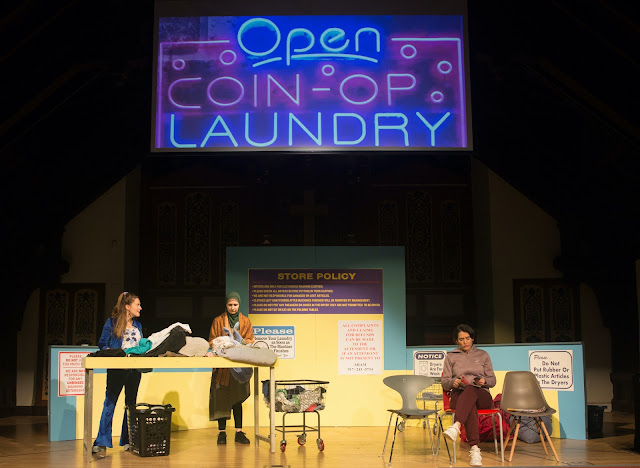Review: Immigrant Women Find One Another In "Lost Sock Laundry"
Lost Sock Laundry
Written by Ivan Faute
Directed by Madelyn Chapman
Presented by UP Theater at Fort Washington Collegiate Church
729 W 181st St., Manhattan, NYC
April 10-27, 2024
 |
Michelle Feza Kuchuk, Haneen Arafat Murphy, and Maria Peyramaure. Photo by Jody Christopherson |
 |
| Yasmin Ranz-Lind and Jesse Castellanos. Photo by Jody Christopherson |
 |
| Jesse Castellanos and Fernando Mateo Jr. Photo by Jody Christopherson |
While the trio do discuss immigrant life–Micaela’s relative, for example, must live with the fear of deportation even though she has been in the United States since she was an infant and now has an American husband and a baby of her own, and the rather unfiltered Irene bluntly asks Dina at one point why she came to the U.S.–the production’s focus is not, as the program notes, immigration as such but rather these lives, which are impacted but not defined solely by and through relocation to a new nation. Irene, Dina, and Micaela share their thoughts on everything from religion to (expectations around) paying bills to the propriety of middle school dances, as well as various of their individual struggles. Micaela’s husband Jorge (Fernando Mateo Jr.), for instance, is affectionate and wants the best for his children but also does not really understand the amount of labor that his wife performs (encapsulated in the symbol of her constant battle against the ever-renewed grease on Jorge's work overalls). Her older son Kelvin (Jesse Castellanos) is hanging out with friends she sees as undesirable and gets in trouble at school, although there is more going on there than it appears. Irene has no children but does have a less than ideal boyfriend named Eric (also Fernando Mateo Jr.), while Dina must deal with caring for three children even as her husband must work at a job far beneath his qualifications. As relationships evolve, even who is helping whom fold sheets at a given time takes on subtle significance. All of these interconnected evolutions are embodied by a terrific cast, whether Castellanos telling Kelvin’s side of events at school; Mateo conjuring compellingly distinct characters as Jorge, Eric, and laundromat manager Aram; Yasmin Ranz-Lind lending just the right touch of timorousness to Dina's daughter Sana; or the wonderfully naturalistic dynamic that Kuckuk, Peyramaure, and Murphy create among the leading trio's contrasting personalities. The play’s impeccably conceived conclusion underlines the cyclicity (and multitudinousness) of communal change–a moving ending to our brief immersion in these families' lives that also promises another new beginning.
-John R. Ziegler and Leah Richards



Comments
Post a Comment